Sexual Health Essay: FGC, Culture, Ethics and Public Health
VerifiedAdded on 2023/06/10
|11
|3880
|379
Essay
AI Summary
This essay delves into the critical aspects of sexual health, with a specific focus on Female Genital Cutting (FGC). It provides a comprehensive overview of FGC, exploring its background, prevalence, and the reasons behind its selection as a key issue. The essay examines the practice from an international perspective, highlighting its impact on public health, emotional, social, and physical wellbeing. It analyzes the influence of culture on sexual health, discussing the historical and societal factors that contribute to FGC. Furthermore, the essay addresses the legal and ethical responses to FGC, including the Female Genital Mutilation Act, and explores the complexities of promoting sexual health within affected communities. The essay concludes by emphasizing the importance of education and awareness in combating FGC and promoting overall sexual health and wellbeing.

SEXUAL HEALTH
1
1
Paraphrase This Document
Need a fresh take? Get an instant paraphrase of this document with our AI Paraphraser
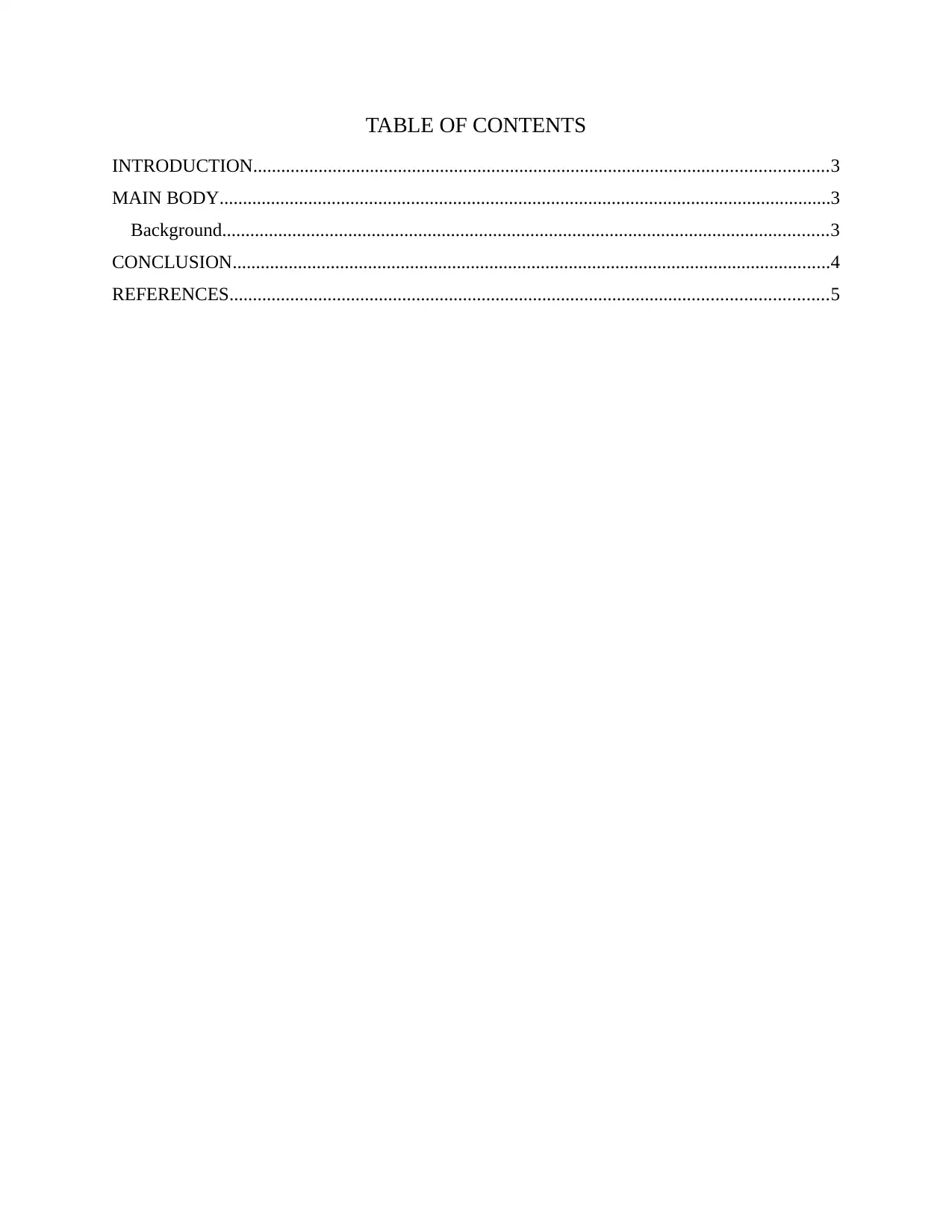
TABLE OF CONTENTS
INTRODUCTION...........................................................................................................................3
MAIN BODY...................................................................................................................................3
Background..................................................................................................................................3
CONCLUSION................................................................................................................................4
REFERENCES................................................................................................................................5
INTRODUCTION...........................................................................................................................3
MAIN BODY...................................................................................................................................3
Background..................................................................................................................................3
CONCLUSION................................................................................................................................4
REFERENCES................................................................................................................................5
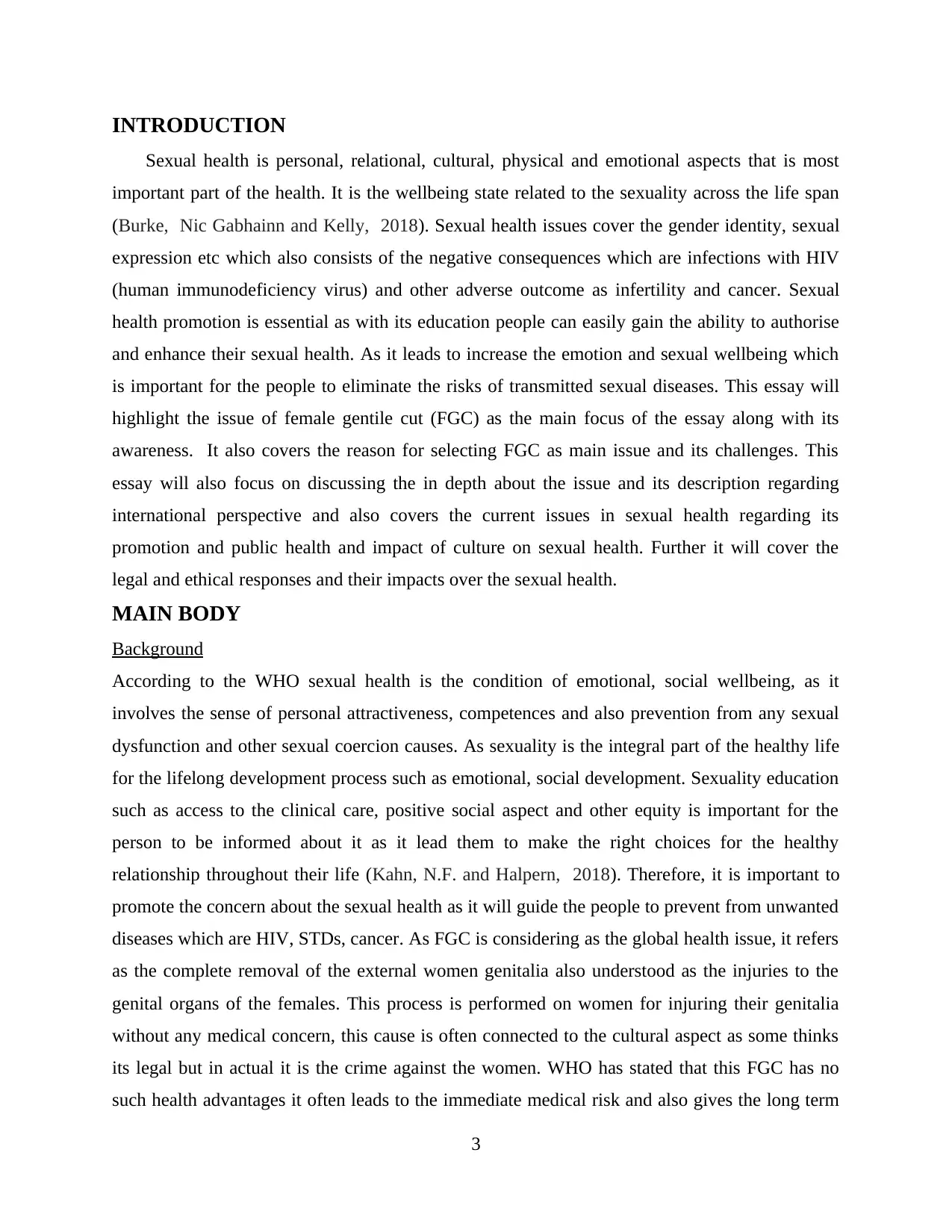
INTRODUCTION
Sexual health is personal, relational, cultural, physical and emotional aspects that is most
important part of the health. It is the wellbeing state related to the sexuality across the life span
(Burke, Nic Gabhainn and Kelly, 2018). Sexual health issues cover the gender identity, sexual
expression etc which also consists of the negative consequences which are infections with HIV
(human immunodeficiency virus) and other adverse outcome as infertility and cancer. Sexual
health promotion is essential as with its education people can easily gain the ability to authorise
and enhance their sexual health. As it leads to increase the emotion and sexual wellbeing which
is important for the people to eliminate the risks of transmitted sexual diseases. This essay will
highlight the issue of female gentile cut (FGC) as the main focus of the essay along with its
awareness. It also covers the reason for selecting FGC as main issue and its challenges. This
essay will also focus on discussing the in depth about the issue and its description regarding
international perspective and also covers the current issues in sexual health regarding its
promotion and public health and impact of culture on sexual health. Further it will cover the
legal and ethical responses and their impacts over the sexual health.
MAIN BODY
Background
According to the WHO sexual health is the condition of emotional, social wellbeing, as it
involves the sense of personal attractiveness, competences and also prevention from any sexual
dysfunction and other sexual coercion causes. As sexuality is the integral part of the healthy life
for the lifelong development process such as emotional, social development. Sexuality education
such as access to the clinical care, positive social aspect and other equity is important for the
person to be informed about it as it lead them to make the right choices for the healthy
relationship throughout their life (Kahn, N.F. and Halpern, 2018). Therefore, it is important to
promote the concern about the sexual health as it will guide the people to prevent from unwanted
diseases which are HIV, STDs, cancer. As FGC is considering as the global health issue, it refers
as the complete removal of the external women genitalia also understood as the injuries to the
genital organs of the females. This process is performed on women for injuring their genitalia
without any medical concern, this cause is often connected to the cultural aspect as some thinks
its legal but in actual it is the crime against the women. WHO has stated that this FGC has no
such health advantages it often leads to the immediate medical risk and also gives the long term
3
Sexual health is personal, relational, cultural, physical and emotional aspects that is most
important part of the health. It is the wellbeing state related to the sexuality across the life span
(Burke, Nic Gabhainn and Kelly, 2018). Sexual health issues cover the gender identity, sexual
expression etc which also consists of the negative consequences which are infections with HIV
(human immunodeficiency virus) and other adverse outcome as infertility and cancer. Sexual
health promotion is essential as with its education people can easily gain the ability to authorise
and enhance their sexual health. As it leads to increase the emotion and sexual wellbeing which
is important for the people to eliminate the risks of transmitted sexual diseases. This essay will
highlight the issue of female gentile cut (FGC) as the main focus of the essay along with its
awareness. It also covers the reason for selecting FGC as main issue and its challenges. This
essay will also focus on discussing the in depth about the issue and its description regarding
international perspective and also covers the current issues in sexual health regarding its
promotion and public health and impact of culture on sexual health. Further it will cover the
legal and ethical responses and their impacts over the sexual health.
MAIN BODY
Background
According to the WHO sexual health is the condition of emotional, social wellbeing, as it
involves the sense of personal attractiveness, competences and also prevention from any sexual
dysfunction and other sexual coercion causes. As sexuality is the integral part of the healthy life
for the lifelong development process such as emotional, social development. Sexuality education
such as access to the clinical care, positive social aspect and other equity is important for the
person to be informed about it as it lead them to make the right choices for the healthy
relationship throughout their life (Kahn, N.F. and Halpern, 2018). Therefore, it is important to
promote the concern about the sexual health as it will guide the people to prevent from unwanted
diseases which are HIV, STDs, cancer. As FGC is considering as the global health issue, it refers
as the complete removal of the external women genitalia also understood as the injuries to the
genital organs of the females. This process is performed on women for injuring their genitalia
without any medical concern, this cause is often connected to the cultural aspect as some thinks
its legal but in actual it is the crime against the women. WHO has stated that this FGC has no
such health advantages it often leads to the immediate medical risk and also gives the long term
3
⊘ This is a preview!⊘
Do you want full access?
Subscribe today to unlock all pages.

Trusted by 1+ million students worldwide
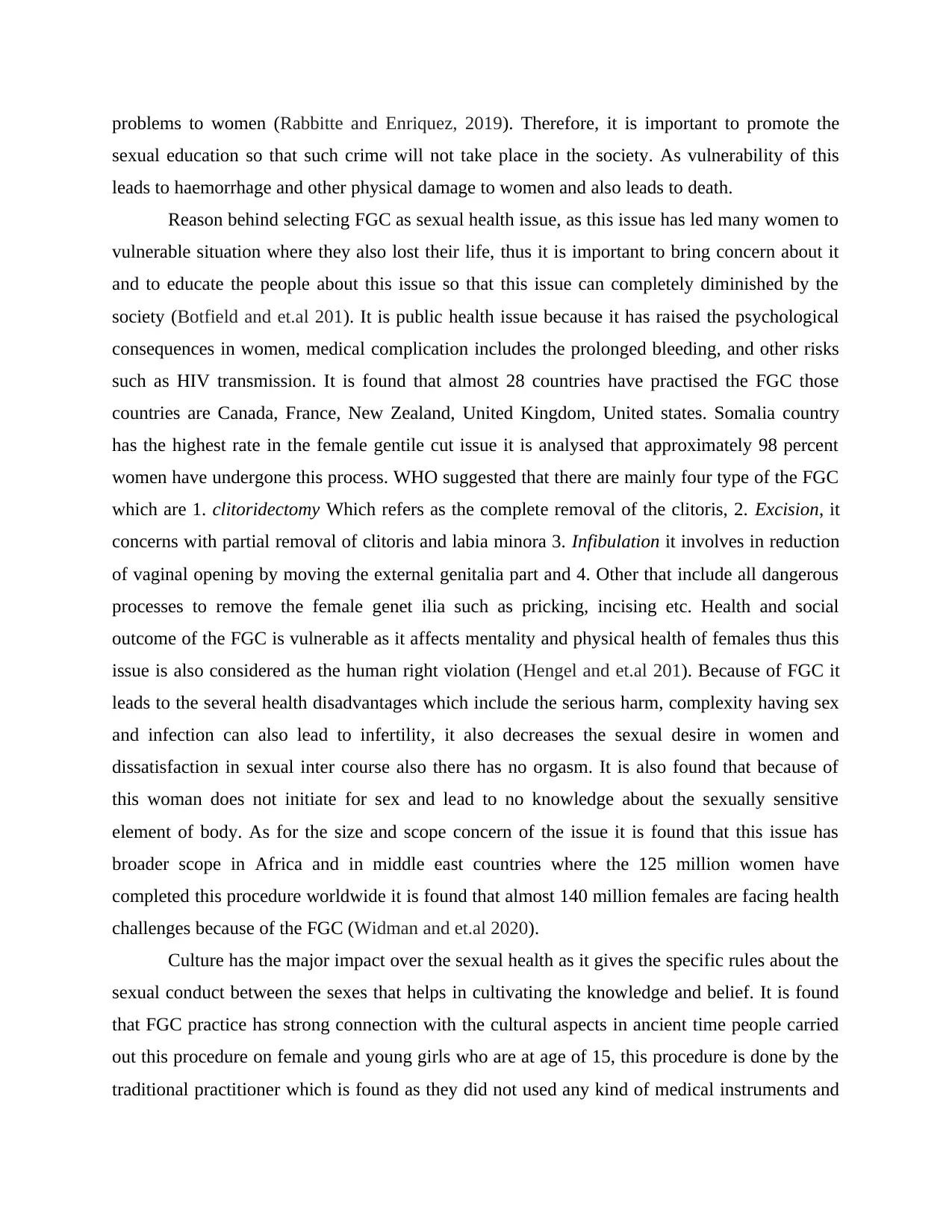
problems to women (Rabbitte and Enriquez, 2019). Therefore, it is important to promote the
sexual education so that such crime will not take place in the society. As vulnerability of this
leads to haemorrhage and other physical damage to women and also leads to death.
Reason behind selecting FGC as sexual health issue, as this issue has led many women to
vulnerable situation where they also lost their life, thus it is important to bring concern about it
and to educate the people about this issue so that this issue can completely diminished by the
society (Botfield and et.al 201). It is public health issue because it has raised the psychological
consequences in women, medical complication includes the prolonged bleeding, and other risks
such as HIV transmission. It is found that almost 28 countries have practised the FGC those
countries are Canada, France, New Zealand, United Kingdom, United states. Somalia country
has the highest rate in the female gentile cut issue it is analysed that approximately 98 percent
women have undergone this process. WHO suggested that there are mainly four type of the FGC
which are 1. clitoridectomy Which refers as the complete removal of the clitoris, 2. Excision, it
concerns with partial removal of clitoris and labia minora 3. Infibulation it involves in reduction
of vaginal opening by moving the external genitalia part and 4. Other that include all dangerous
processes to remove the female genet ilia such as pricking, incising etc. Health and social
outcome of the FGC is vulnerable as it affects mentality and physical health of females thus this
issue is also considered as the human right violation (Hengel and et.al 201). Because of FGC it
leads to the several health disadvantages which include the serious harm, complexity having sex
and infection can also lead to infertility, it also decreases the sexual desire in women and
dissatisfaction in sexual inter course also there has no orgasm. It is also found that because of
this woman does not initiate for sex and lead to no knowledge about the sexually sensitive
element of body. As for the size and scope concern of the issue it is found that this issue has
broader scope in Africa and in middle east countries where the 125 million women have
completed this procedure worldwide it is found that almost 140 million females are facing health
challenges because of the FGC (Widman and et.al 2020).
Culture has the major impact over the sexual health as it gives the specific rules about the
sexual conduct between the sexes that helps in cultivating the knowledge and belief. It is found
that FGC practice has strong connection with the cultural aspects in ancient time people carried
out this procedure on female and young girls who are at age of 15, this procedure is done by the
traditional practitioner which is found as they did not used any kind of medical instruments and
sexual education so that such crime will not take place in the society. As vulnerability of this
leads to haemorrhage and other physical damage to women and also leads to death.
Reason behind selecting FGC as sexual health issue, as this issue has led many women to
vulnerable situation where they also lost their life, thus it is important to bring concern about it
and to educate the people about this issue so that this issue can completely diminished by the
society (Botfield and et.al 201). It is public health issue because it has raised the psychological
consequences in women, medical complication includes the prolonged bleeding, and other risks
such as HIV transmission. It is found that almost 28 countries have practised the FGC those
countries are Canada, France, New Zealand, United Kingdom, United states. Somalia country
has the highest rate in the female gentile cut issue it is analysed that approximately 98 percent
women have undergone this process. WHO suggested that there are mainly four type of the FGC
which are 1. clitoridectomy Which refers as the complete removal of the clitoris, 2. Excision, it
concerns with partial removal of clitoris and labia minora 3. Infibulation it involves in reduction
of vaginal opening by moving the external genitalia part and 4. Other that include all dangerous
processes to remove the female genet ilia such as pricking, incising etc. Health and social
outcome of the FGC is vulnerable as it affects mentality and physical health of females thus this
issue is also considered as the human right violation (Hengel and et.al 201). Because of FGC it
leads to the several health disadvantages which include the serious harm, complexity having sex
and infection can also lead to infertility, it also decreases the sexual desire in women and
dissatisfaction in sexual inter course also there has no orgasm. It is also found that because of
this woman does not initiate for sex and lead to no knowledge about the sexually sensitive
element of body. As for the size and scope concern of the issue it is found that this issue has
broader scope in Africa and in middle east countries where the 125 million women have
completed this procedure worldwide it is found that almost 140 million females are facing health
challenges because of the FGC (Widman and et.al 2020).
Culture has the major impact over the sexual health as it gives the specific rules about the
sexual conduct between the sexes that helps in cultivating the knowledge and belief. It is found
that FGC practice has strong connection with the cultural aspects in ancient time people carried
out this procedure on female and young girls who are at age of 15, this procedure is done by the
traditional practitioner which is found as they did not used any kind of medical instruments and
Paraphrase This Document
Need a fresh take? Get an instant paraphrase of this document with our AI Paraphraser
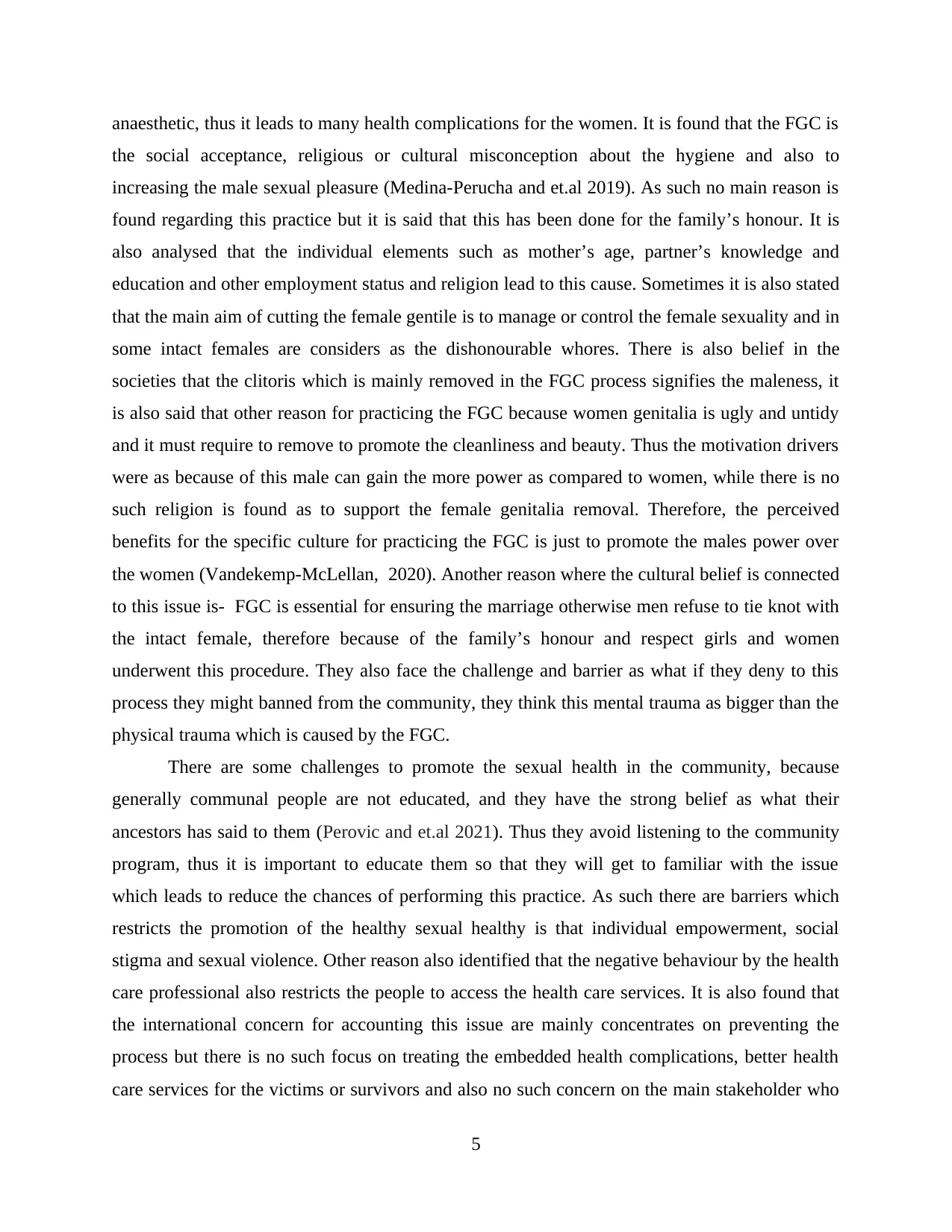
anaesthetic, thus it leads to many health complications for the women. It is found that the FGC is
the social acceptance, religious or cultural misconception about the hygiene and also to
increasing the male sexual pleasure (Medina-Perucha and et.al 2019). As such no main reason is
found regarding this practice but it is said that this has been done for the family’s honour. It is
also analysed that the individual elements such as mother’s age, partner’s knowledge and
education and other employment status and religion lead to this cause. Sometimes it is also stated
that the main aim of cutting the female gentile is to manage or control the female sexuality and in
some intact females are considers as the dishonourable whores. There is also belief in the
societies that the clitoris which is mainly removed in the FGC process signifies the maleness, it
is also said that other reason for practicing the FGC because women genitalia is ugly and untidy
and it must require to remove to promote the cleanliness and beauty. Thus the motivation drivers
were as because of this male can gain the more power as compared to women, while there is no
such religion is found as to support the female genitalia removal. Therefore, the perceived
benefits for the specific culture for practicing the FGC is just to promote the males power over
the women (Vandekemp-McLellan, 2020). Another reason where the cultural belief is connected
to this issue is- FGC is essential for ensuring the marriage otherwise men refuse to tie knot with
the intact female, therefore because of the family’s honour and respect girls and women
underwent this procedure. They also face the challenge and barrier as what if they deny to this
process they might banned from the community, they think this mental trauma as bigger than the
physical trauma which is caused by the FGC.
There are some challenges to promote the sexual health in the community, because
generally communal people are not educated, and they have the strong belief as what their
ancestors has said to them (Perovic and et.al 2021). Thus they avoid listening to the community
program, thus it is important to educate them so that they will get to familiar with the issue
which leads to reduce the chances of performing this practice. As such there are barriers which
restricts the promotion of the healthy sexual healthy is that individual empowerment, social
stigma and sexual violence. Other reason also identified that the negative behaviour by the health
care professional also restricts the people to access the health care services. It is also found that
the international concern for accounting this issue are mainly concentrates on preventing the
process but there is no such focus on treating the embedded health complications, better health
care services for the victims or survivors and also no such concern on the main stakeholder who
5
the social acceptance, religious or cultural misconception about the hygiene and also to
increasing the male sexual pleasure (Medina-Perucha and et.al 2019). As such no main reason is
found regarding this practice but it is said that this has been done for the family’s honour. It is
also analysed that the individual elements such as mother’s age, partner’s knowledge and
education and other employment status and religion lead to this cause. Sometimes it is also stated
that the main aim of cutting the female gentile is to manage or control the female sexuality and in
some intact females are considers as the dishonourable whores. There is also belief in the
societies that the clitoris which is mainly removed in the FGC process signifies the maleness, it
is also said that other reason for practicing the FGC because women genitalia is ugly and untidy
and it must require to remove to promote the cleanliness and beauty. Thus the motivation drivers
were as because of this male can gain the more power as compared to women, while there is no
such religion is found as to support the female genitalia removal. Therefore, the perceived
benefits for the specific culture for practicing the FGC is just to promote the males power over
the women (Vandekemp-McLellan, 2020). Another reason where the cultural belief is connected
to this issue is- FGC is essential for ensuring the marriage otherwise men refuse to tie knot with
the intact female, therefore because of the family’s honour and respect girls and women
underwent this procedure. They also face the challenge and barrier as what if they deny to this
process they might banned from the community, they think this mental trauma as bigger than the
physical trauma which is caused by the FGC.
There are some challenges to promote the sexual health in the community, because
generally communal people are not educated, and they have the strong belief as what their
ancestors has said to them (Perovic and et.al 2021). Thus they avoid listening to the community
program, thus it is important to educate them so that they will get to familiar with the issue
which leads to reduce the chances of performing this practice. As such there are barriers which
restricts the promotion of the healthy sexual healthy is that individual empowerment, social
stigma and sexual violence. Other reason also identified that the negative behaviour by the health
care professional also restricts the people to access the health care services. It is also found that
the international concern for accounting this issue are mainly concentrates on preventing the
process but there is no such focus on treating the embedded health complications, better health
care services for the victims or survivors and also no such concern on the main stakeholder who
5
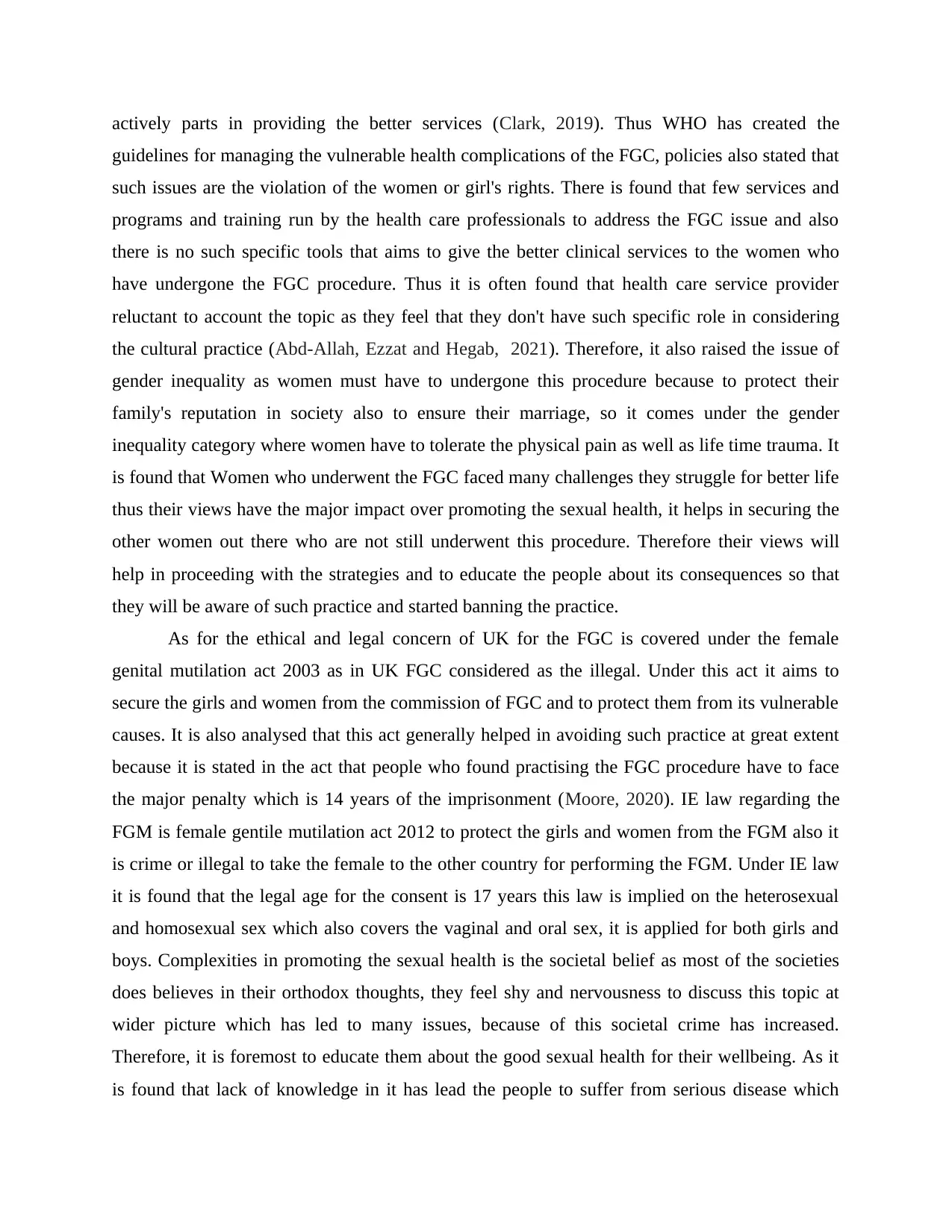
actively parts in providing the better services (Clark, 2019). Thus WHO has created the
guidelines for managing the vulnerable health complications of the FGC, policies also stated that
such issues are the violation of the women or girl's rights. There is found that few services and
programs and training run by the health care professionals to address the FGC issue and also
there is no such specific tools that aims to give the better clinical services to the women who
have undergone the FGC procedure. Thus it is often found that health care service provider
reluctant to account the topic as they feel that they don't have such specific role in considering
the cultural practice (Abd-Allah, Ezzat and Hegab, 2021). Therefore, it also raised the issue of
gender inequality as women must have to undergone this procedure because to protect their
family's reputation in society also to ensure their marriage, so it comes under the gender
inequality category where women have to tolerate the physical pain as well as life time trauma. It
is found that Women who underwent the FGC faced many challenges they struggle for better life
thus their views have the major impact over promoting the sexual health, it helps in securing the
other women out there who are not still underwent this procedure. Therefore their views will
help in proceeding with the strategies and to educate the people about its consequences so that
they will be aware of such practice and started banning the practice.
As for the ethical and legal concern of UK for the FGC is covered under the female
genital mutilation act 2003 as in UK FGC considered as the illegal. Under this act it aims to
secure the girls and women from the commission of FGC and to protect them from its vulnerable
causes. It is also analysed that this act generally helped in avoiding such practice at great extent
because it is stated in the act that people who found practising the FGC procedure have to face
the major penalty which is 14 years of the imprisonment (Moore, 2020). IE law regarding the
FGM is female gentile mutilation act 2012 to protect the girls and women from the FGM also it
is crime or illegal to take the female to the other country for performing the FGM. Under IE law
it is found that the legal age for the consent is 17 years this law is implied on the heterosexual
and homosexual sex which also covers the vaginal and oral sex, it is applied for both girls and
boys. Complexities in promoting the sexual health is the societal belief as most of the societies
does believes in their orthodox thoughts, they feel shy and nervousness to discuss this topic at
wider picture which has led to many issues, because of this societal crime has increased.
Therefore, it is foremost to educate them about the good sexual health for their wellbeing. As it
is found that lack of knowledge in it has lead the people to suffer from serious disease which
guidelines for managing the vulnerable health complications of the FGC, policies also stated that
such issues are the violation of the women or girl's rights. There is found that few services and
programs and training run by the health care professionals to address the FGC issue and also
there is no such specific tools that aims to give the better clinical services to the women who
have undergone the FGC procedure. Thus it is often found that health care service provider
reluctant to account the topic as they feel that they don't have such specific role in considering
the cultural practice (Abd-Allah, Ezzat and Hegab, 2021). Therefore, it also raised the issue of
gender inequality as women must have to undergone this procedure because to protect their
family's reputation in society also to ensure their marriage, so it comes under the gender
inequality category where women have to tolerate the physical pain as well as life time trauma. It
is found that Women who underwent the FGC faced many challenges they struggle for better life
thus their views have the major impact over promoting the sexual health, it helps in securing the
other women out there who are not still underwent this procedure. Therefore their views will
help in proceeding with the strategies and to educate the people about its consequences so that
they will be aware of such practice and started banning the practice.
As for the ethical and legal concern of UK for the FGC is covered under the female
genital mutilation act 2003 as in UK FGC considered as the illegal. Under this act it aims to
secure the girls and women from the commission of FGC and to protect them from its vulnerable
causes. It is also analysed that this act generally helped in avoiding such practice at great extent
because it is stated in the act that people who found practising the FGC procedure have to face
the major penalty which is 14 years of the imprisonment (Moore, 2020). IE law regarding the
FGM is female gentile mutilation act 2012 to protect the girls and women from the FGM also it
is crime or illegal to take the female to the other country for performing the FGM. Under IE law
it is found that the legal age for the consent is 17 years this law is implied on the heterosexual
and homosexual sex which also covers the vaginal and oral sex, it is applied for both girls and
boys. Complexities in promoting the sexual health is the societal belief as most of the societies
does believes in their orthodox thoughts, they feel shy and nervousness to discuss this topic at
wider picture which has led to many issues, because of this societal crime has increased.
Therefore, it is foremost to educate them about the good sexual health for their wellbeing. As it
is found that lack of knowledge in it has lead the people to suffer from serious disease which
⊘ This is a preview!⊘
Do you want full access?
Subscribe today to unlock all pages.

Trusted by 1+ million students worldwide
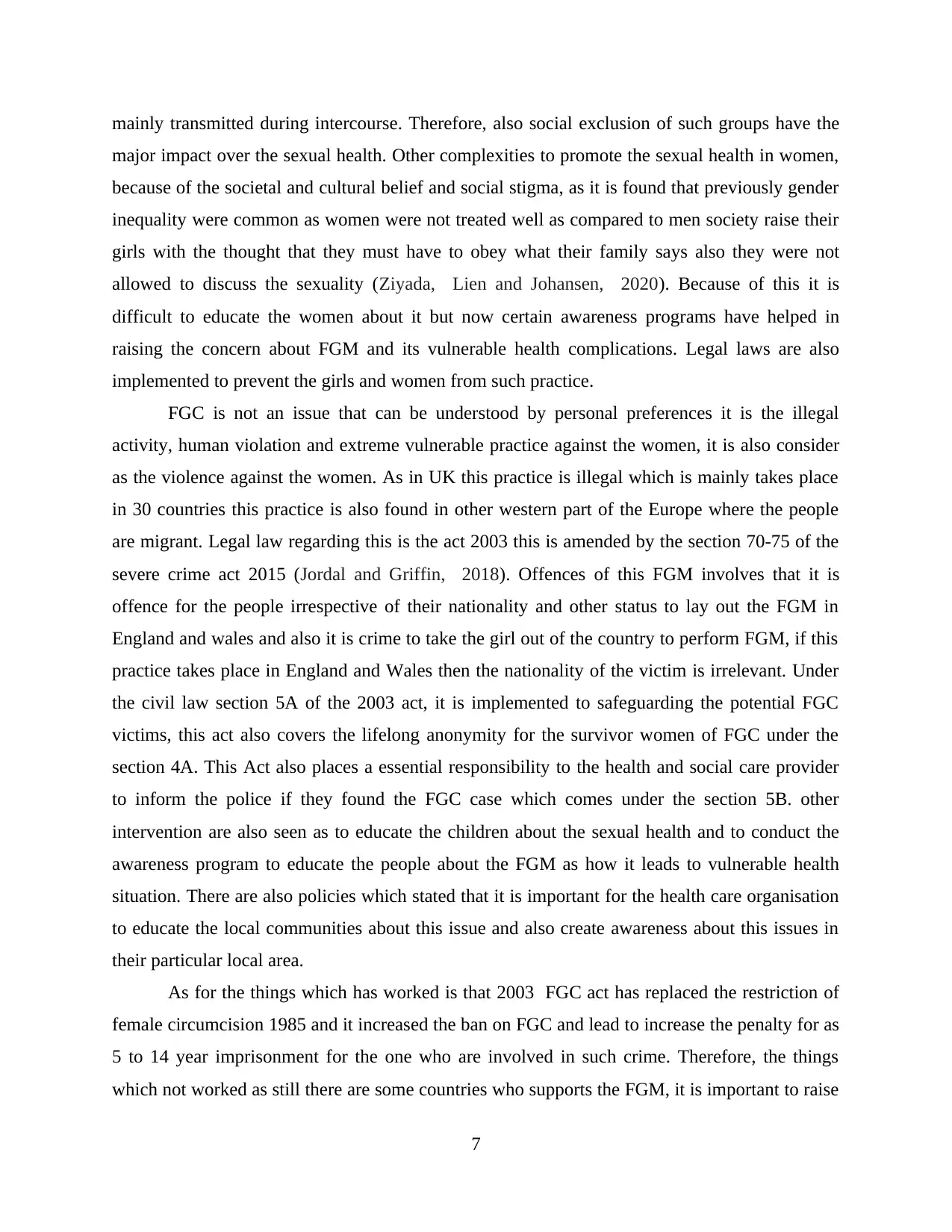
mainly transmitted during intercourse. Therefore, also social exclusion of such groups have the
major impact over the sexual health. Other complexities to promote the sexual health in women,
because of the societal and cultural belief and social stigma, as it is found that previously gender
inequality were common as women were not treated well as compared to men society raise their
girls with the thought that they must have to obey what their family says also they were not
allowed to discuss the sexuality (Ziyada, Lien and Johansen, 2020). Because of this it is
difficult to educate the women about it but now certain awareness programs have helped in
raising the concern about FGM and its vulnerable health complications. Legal laws are also
implemented to prevent the girls and women from such practice.
FGC is not an issue that can be understood by personal preferences it is the illegal
activity, human violation and extreme vulnerable practice against the women, it is also consider
as the violence against the women. As in UK this practice is illegal which is mainly takes place
in 30 countries this practice is also found in other western part of the Europe where the people
are migrant. Legal law regarding this is the act 2003 this is amended by the section 70-75 of the
severe crime act 2015 (Jordal and Griffin, 2018). Offences of this FGM involves that it is
offence for the people irrespective of their nationality and other status to lay out the FGM in
England and wales and also it is crime to take the girl out of the country to perform FGM, if this
practice takes place in England and Wales then the nationality of the victim is irrelevant. Under
the civil law section 5A of the 2003 act, it is implemented to safeguarding the potential FGC
victims, this act also covers the lifelong anonymity for the survivor women of FGC under the
section 4A. This Act also places a essential responsibility to the health and social care provider
to inform the police if they found the FGC case which comes under the section 5B. other
intervention are also seen as to educate the children about the sexual health and to conduct the
awareness program to educate the people about the FGM as how it leads to vulnerable health
situation. There are also policies which stated that it is important for the health care organisation
to educate the local communities about this issue and also create awareness about this issues in
their particular local area.
As for the things which has worked is that 2003 FGC act has replaced the restriction of
female circumcision 1985 and it increased the ban on FGC and lead to increase the penalty for as
5 to 14 year imprisonment for the one who are involved in such crime. Therefore, the things
which not worked as still there are some countries who supports the FGM, it is important to raise
7
major impact over the sexual health. Other complexities to promote the sexual health in women,
because of the societal and cultural belief and social stigma, as it is found that previously gender
inequality were common as women were not treated well as compared to men society raise their
girls with the thought that they must have to obey what their family says also they were not
allowed to discuss the sexuality (Ziyada, Lien and Johansen, 2020). Because of this it is
difficult to educate the women about it but now certain awareness programs have helped in
raising the concern about FGM and its vulnerable health complications. Legal laws are also
implemented to prevent the girls and women from such practice.
FGC is not an issue that can be understood by personal preferences it is the illegal
activity, human violation and extreme vulnerable practice against the women, it is also consider
as the violence against the women. As in UK this practice is illegal which is mainly takes place
in 30 countries this practice is also found in other western part of the Europe where the people
are migrant. Legal law regarding this is the act 2003 this is amended by the section 70-75 of the
severe crime act 2015 (Jordal and Griffin, 2018). Offences of this FGM involves that it is
offence for the people irrespective of their nationality and other status to lay out the FGM in
England and wales and also it is crime to take the girl out of the country to perform FGM, if this
practice takes place in England and Wales then the nationality of the victim is irrelevant. Under
the civil law section 5A of the 2003 act, it is implemented to safeguarding the potential FGC
victims, this act also covers the lifelong anonymity for the survivor women of FGC under the
section 4A. This Act also places a essential responsibility to the health and social care provider
to inform the police if they found the FGC case which comes under the section 5B. other
intervention are also seen as to educate the children about the sexual health and to conduct the
awareness program to educate the people about the FGM as how it leads to vulnerable health
situation. There are also policies which stated that it is important for the health care organisation
to educate the local communities about this issue and also create awareness about this issues in
their particular local area.
As for the things which has worked is that 2003 FGC act has replaced the restriction of
female circumcision 1985 and it increased the ban on FGC and lead to increase the penalty for as
5 to 14 year imprisonment for the one who are involved in such crime. Therefore, the things
which not worked as still there are some countries who supports the FGM, it is important to raise
7
Paraphrase This Document
Need a fresh take? Get an instant paraphrase of this document with our AI Paraphraser
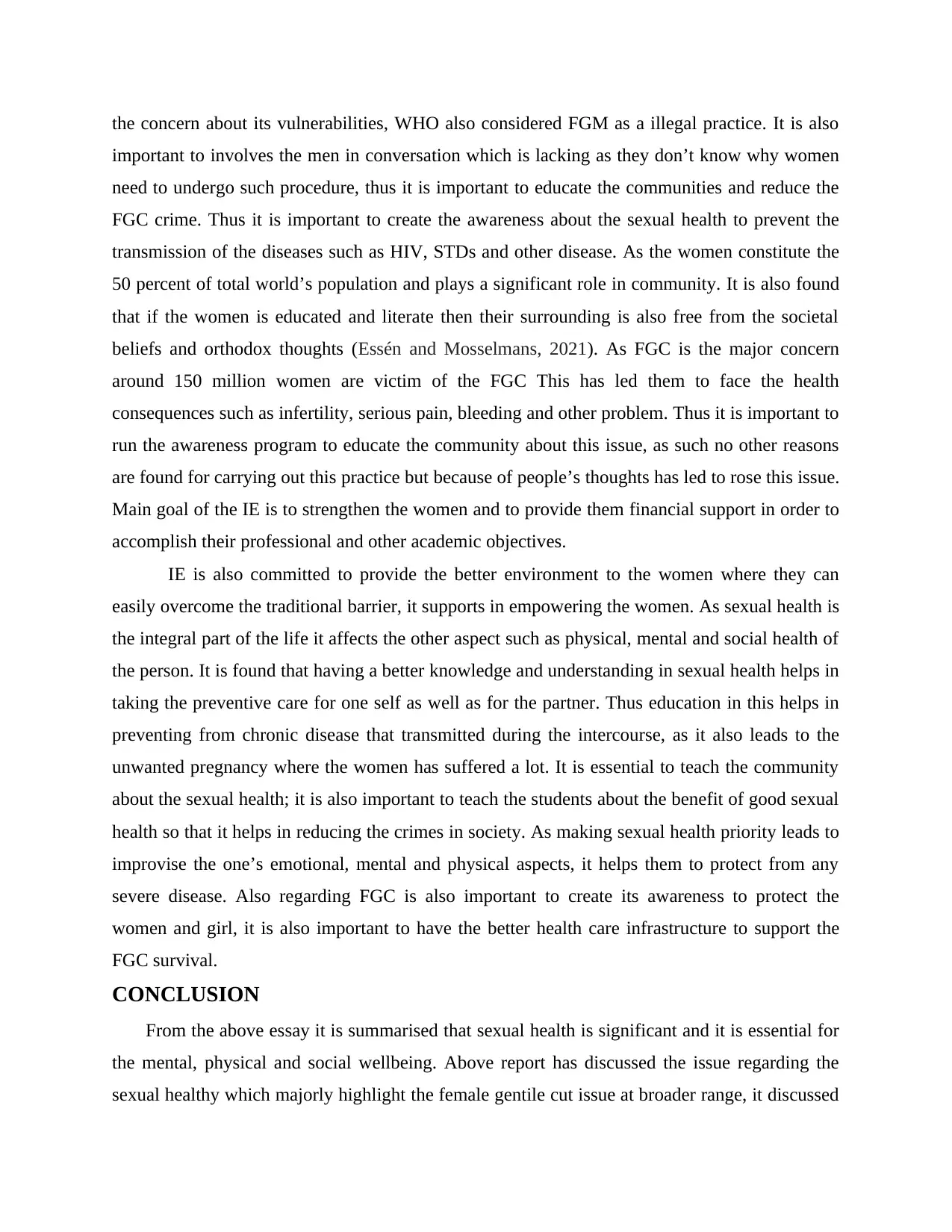
the concern about its vulnerabilities, WHO also considered FGM as a illegal practice. It is also
important to involves the men in conversation which is lacking as they don’t know why women
need to undergo such procedure, thus it is important to educate the communities and reduce the
FGC crime. Thus it is important to create the awareness about the sexual health to prevent the
transmission of the diseases such as HIV, STDs and other disease. As the women constitute the
50 percent of total world’s population and plays a significant role in community. It is also found
that if the women is educated and literate then their surrounding is also free from the societal
beliefs and orthodox thoughts (Essén and Mosselmans, 2021). As FGC is the major concern
around 150 million women are victim of the FGC This has led them to face the health
consequences such as infertility, serious pain, bleeding and other problem. Thus it is important to
run the awareness program to educate the community about this issue, as such no other reasons
are found for carrying out this practice but because of people’s thoughts has led to rose this issue.
Main goal of the IE is to strengthen the women and to provide them financial support in order to
accomplish their professional and other academic objectives.
IE is also committed to provide the better environment to the women where they can
easily overcome the traditional barrier, it supports in empowering the women. As sexual health is
the integral part of the life it affects the other aspect such as physical, mental and social health of
the person. It is found that having a better knowledge and understanding in sexual health helps in
taking the preventive care for one self as well as for the partner. Thus education in this helps in
preventing from chronic disease that transmitted during the intercourse, as it also leads to the
unwanted pregnancy where the women has suffered a lot. It is essential to teach the community
about the sexual health; it is also important to teach the students about the benefit of good sexual
health so that it helps in reducing the crimes in society. As making sexual health priority leads to
improvise the one’s emotional, mental and physical aspects, it helps them to protect from any
severe disease. Also regarding FGC is also important to create its awareness to protect the
women and girl, it is also important to have the better health care infrastructure to support the
FGC survival.
CONCLUSION
From the above essay it is summarised that sexual health is significant and it is essential for
the mental, physical and social wellbeing. Above report has discussed the issue regarding the
sexual healthy which majorly highlight the female gentile cut issue at broader range, it discussed
important to involves the men in conversation which is lacking as they don’t know why women
need to undergo such procedure, thus it is important to educate the communities and reduce the
FGC crime. Thus it is important to create the awareness about the sexual health to prevent the
transmission of the diseases such as HIV, STDs and other disease. As the women constitute the
50 percent of total world’s population and plays a significant role in community. It is also found
that if the women is educated and literate then their surrounding is also free from the societal
beliefs and orthodox thoughts (Essén and Mosselmans, 2021). As FGC is the major concern
around 150 million women are victim of the FGC This has led them to face the health
consequences such as infertility, serious pain, bleeding and other problem. Thus it is important to
run the awareness program to educate the community about this issue, as such no other reasons
are found for carrying out this practice but because of people’s thoughts has led to rose this issue.
Main goal of the IE is to strengthen the women and to provide them financial support in order to
accomplish their professional and other academic objectives.
IE is also committed to provide the better environment to the women where they can
easily overcome the traditional barrier, it supports in empowering the women. As sexual health is
the integral part of the life it affects the other aspect such as physical, mental and social health of
the person. It is found that having a better knowledge and understanding in sexual health helps in
taking the preventive care for one self as well as for the partner. Thus education in this helps in
preventing from chronic disease that transmitted during the intercourse, as it also leads to the
unwanted pregnancy where the women has suffered a lot. It is essential to teach the community
about the sexual health; it is also important to teach the students about the benefit of good sexual
health so that it helps in reducing the crimes in society. As making sexual health priority leads to
improvise the one’s emotional, mental and physical aspects, it helps them to protect from any
severe disease. Also regarding FGC is also important to create its awareness to protect the
women and girl, it is also important to have the better health care infrastructure to support the
FGC survival.
CONCLUSION
From the above essay it is summarised that sexual health is significant and it is essential for
the mental, physical and social wellbeing. Above report has discussed the issue regarding the
sexual healthy which majorly highlight the female gentile cut issue at broader range, it discussed
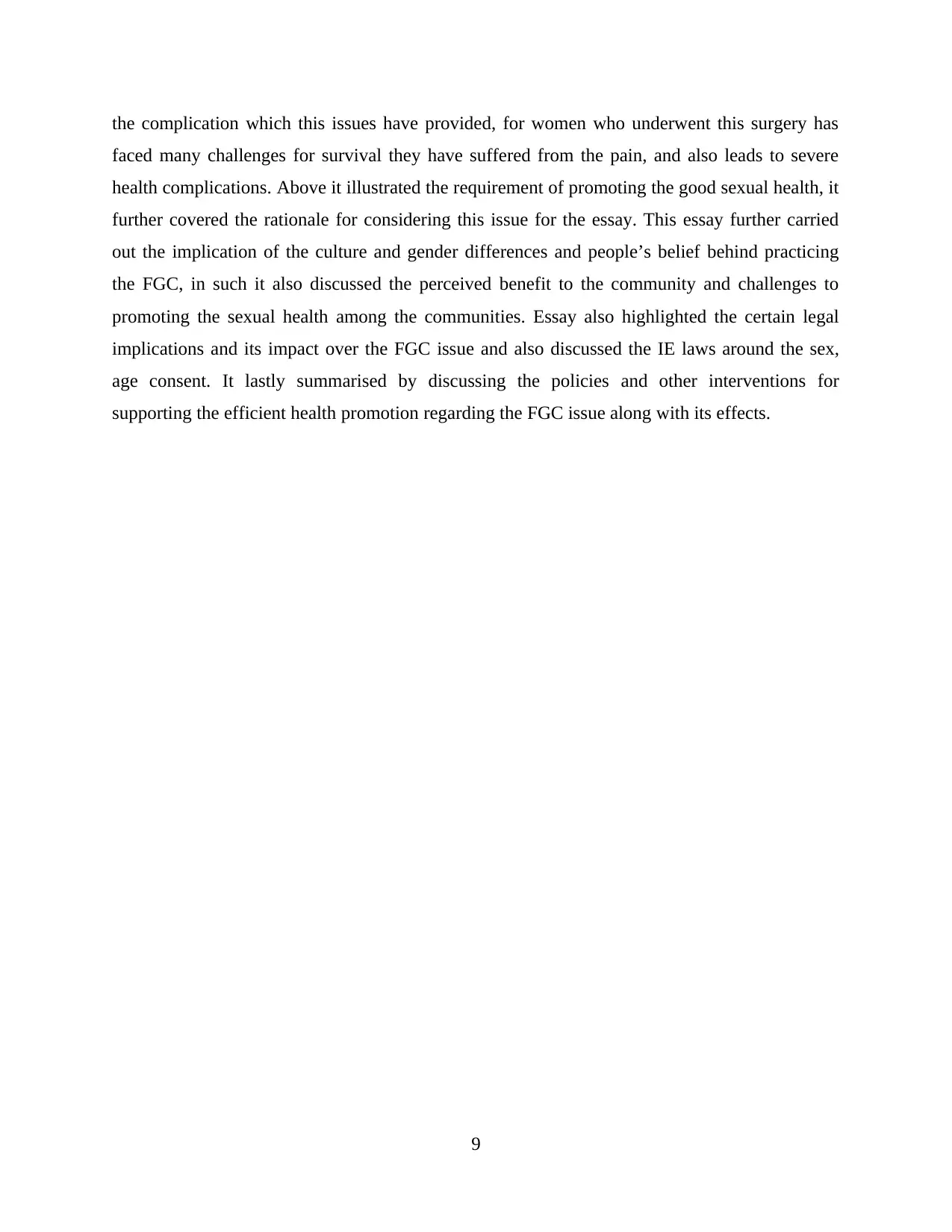
the complication which this issues have provided, for women who underwent this surgery has
faced many challenges for survival they have suffered from the pain, and also leads to severe
health complications. Above it illustrated the requirement of promoting the good sexual health, it
further covered the rationale for considering this issue for the essay. This essay further carried
out the implication of the culture and gender differences and people’s belief behind practicing
the FGC, in such it also discussed the perceived benefit to the community and challenges to
promoting the sexual health among the communities. Essay also highlighted the certain legal
implications and its impact over the FGC issue and also discussed the IE laws around the sex,
age consent. It lastly summarised by discussing the policies and other interventions for
supporting the efficient health promotion regarding the FGC issue along with its effects.
9
faced many challenges for survival they have suffered from the pain, and also leads to severe
health complications. Above it illustrated the requirement of promoting the good sexual health, it
further covered the rationale for considering this issue for the essay. This essay further carried
out the implication of the culture and gender differences and people’s belief behind practicing
the FGC, in such it also discussed the perceived benefit to the community and challenges to
promoting the sexual health among the communities. Essay also highlighted the certain legal
implications and its impact over the FGC issue and also discussed the IE laws around the sex,
age consent. It lastly summarised by discussing the policies and other interventions for
supporting the efficient health promotion regarding the FGC issue along with its effects.
9
⊘ This is a preview!⊘
Do you want full access?
Subscribe today to unlock all pages.

Trusted by 1+ million students worldwide
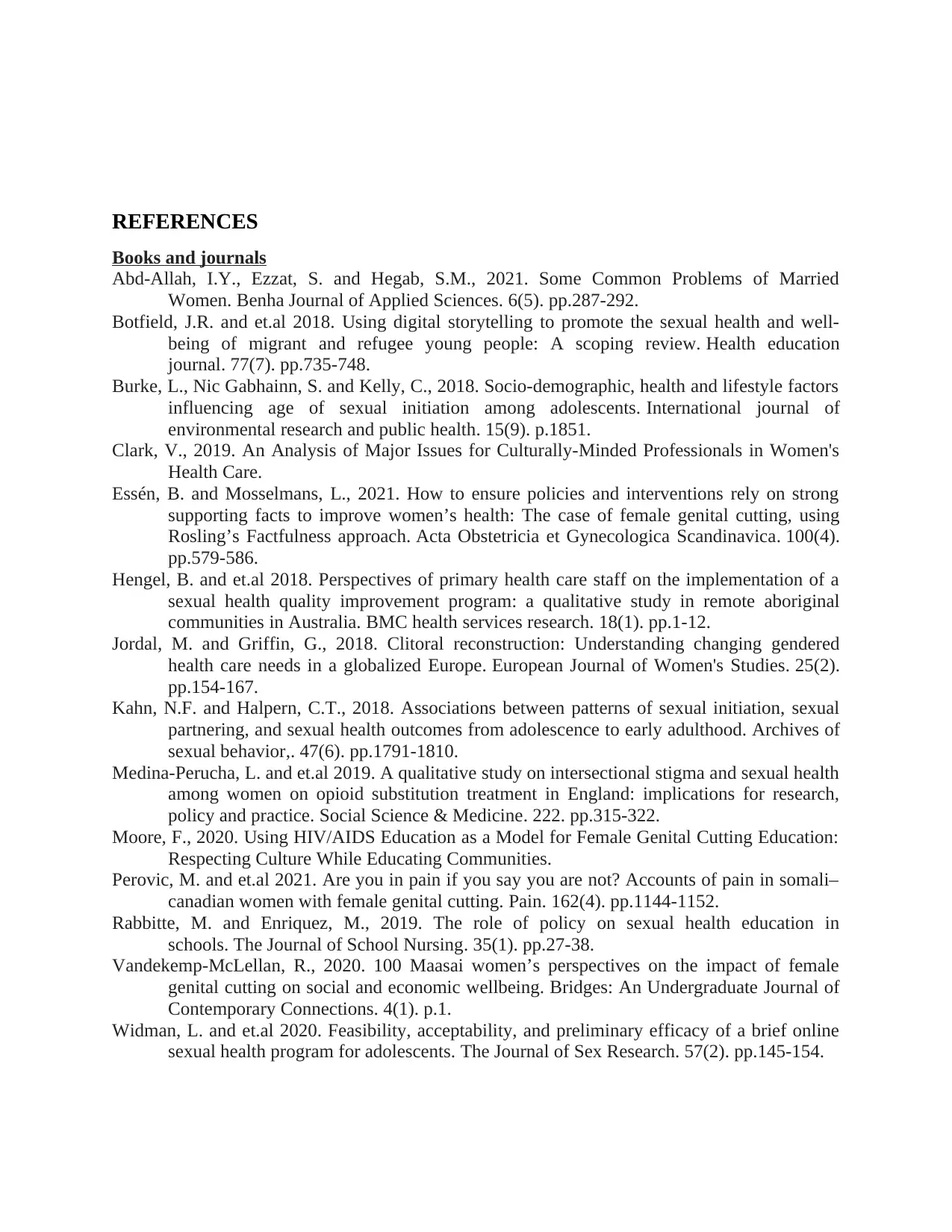
REFERENCES
Books and journals
Abd-Allah, I.Y., Ezzat, S. and Hegab, S.M., 2021. Some Common Problems of Married
Women. Benha Journal of Applied Sciences. 6(5). pp.287-292.
Botfield, J.R. and et.al 2018. Using digital storytelling to promote the sexual health and well-
being of migrant and refugee young people: A scoping review. Health education
journal. 77(7). pp.735-748.
Burke, L., Nic Gabhainn, S. and Kelly, C., 2018. Socio-demographic, health and lifestyle factors
influencing age of sexual initiation among adolescents. International journal of
environmental research and public health. 15(9). p.1851.
Clark, V., 2019. An Analysis of Major Issues for Culturally-Minded Professionals in Women's
Health Care.
Essén, B. and Mosselmans, L., 2021. How to ensure policies and interventions rely on strong
supporting facts to improve women’s health: The case of female genital cutting, using
Rosling’s Factfulness approach. Acta Obstetricia et Gynecologica Scandinavica. 100(4).
pp.579-586.
Hengel, B. and et.al 2018. Perspectives of primary health care staff on the implementation of a
sexual health quality improvement program: a qualitative study in remote aboriginal
communities in Australia. BMC health services research. 18(1). pp.1-12.
Jordal, M. and Griffin, G., 2018. Clitoral reconstruction: Understanding changing gendered
health care needs in a globalized Europe. European Journal of Women's Studies. 25(2).
pp.154-167.
Kahn, N.F. and Halpern, C.T., 2018. Associations between patterns of sexual initiation, sexual
partnering, and sexual health outcomes from adolescence to early adulthood. Archives of
sexual behavior,. 47(6). pp.1791-1810.
Medina-Perucha, L. and et.al 2019. A qualitative study on intersectional stigma and sexual health
among women on opioid substitution treatment in England: implications for research,
policy and practice. Social Science & Medicine. 222. pp.315-322.
Moore, F., 2020. Using HIV/AIDS Education as a Model for Female Genital Cutting Education:
Respecting Culture While Educating Communities.
Perovic, M. and et.al 2021. Are you in pain if you say you are not? Accounts of pain in somali–
canadian women with female genital cutting. Pain. 162(4). pp.1144-1152.
Rabbitte, M. and Enriquez, M., 2019. The role of policy on sexual health education in
schools. The Journal of School Nursing. 35(1). pp.27-38.
Vandekemp-McLellan, R., 2020. 100 Maasai women’s perspectives on the impact of female
genital cutting on social and economic wellbeing. Bridges: An Undergraduate Journal of
Contemporary Connections. 4(1). p.1.
Widman, L. and et.al 2020. Feasibility, acceptability, and preliminary efficacy of a brief online
sexual health program for adolescents. The Journal of Sex Research. 57(2). pp.145-154.
Books and journals
Abd-Allah, I.Y., Ezzat, S. and Hegab, S.M., 2021. Some Common Problems of Married
Women. Benha Journal of Applied Sciences. 6(5). pp.287-292.
Botfield, J.R. and et.al 2018. Using digital storytelling to promote the sexual health and well-
being of migrant and refugee young people: A scoping review. Health education
journal. 77(7). pp.735-748.
Burke, L., Nic Gabhainn, S. and Kelly, C., 2018. Socio-demographic, health and lifestyle factors
influencing age of sexual initiation among adolescents. International journal of
environmental research and public health. 15(9). p.1851.
Clark, V., 2019. An Analysis of Major Issues for Culturally-Minded Professionals in Women's
Health Care.
Essén, B. and Mosselmans, L., 2021. How to ensure policies and interventions rely on strong
supporting facts to improve women’s health: The case of female genital cutting, using
Rosling’s Factfulness approach. Acta Obstetricia et Gynecologica Scandinavica. 100(4).
pp.579-586.
Hengel, B. and et.al 2018. Perspectives of primary health care staff on the implementation of a
sexual health quality improvement program: a qualitative study in remote aboriginal
communities in Australia. BMC health services research. 18(1). pp.1-12.
Jordal, M. and Griffin, G., 2018. Clitoral reconstruction: Understanding changing gendered
health care needs in a globalized Europe. European Journal of Women's Studies. 25(2).
pp.154-167.
Kahn, N.F. and Halpern, C.T., 2018. Associations between patterns of sexual initiation, sexual
partnering, and sexual health outcomes from adolescence to early adulthood. Archives of
sexual behavior,. 47(6). pp.1791-1810.
Medina-Perucha, L. and et.al 2019. A qualitative study on intersectional stigma and sexual health
among women on opioid substitution treatment in England: implications for research,
policy and practice. Social Science & Medicine. 222. pp.315-322.
Moore, F., 2020. Using HIV/AIDS Education as a Model for Female Genital Cutting Education:
Respecting Culture While Educating Communities.
Perovic, M. and et.al 2021. Are you in pain if you say you are not? Accounts of pain in somali–
canadian women with female genital cutting. Pain. 162(4). pp.1144-1152.
Rabbitte, M. and Enriquez, M., 2019. The role of policy on sexual health education in
schools. The Journal of School Nursing. 35(1). pp.27-38.
Vandekemp-McLellan, R., 2020. 100 Maasai women’s perspectives on the impact of female
genital cutting on social and economic wellbeing. Bridges: An Undergraduate Journal of
Contemporary Connections. 4(1). p.1.
Widman, L. and et.al 2020. Feasibility, acceptability, and preliminary efficacy of a brief online
sexual health program for adolescents. The Journal of Sex Research. 57(2). pp.145-154.
Paraphrase This Document
Need a fresh take? Get an instant paraphrase of this document with our AI Paraphraser

Ziyada, M.M., Lien, I.L. and Johansen, R.E.B., 2020. Sexual norms and the intention to use
healthcare services related to female genital cutting: A qualitative study among Somali
and Sudanese women in Norway. PloS one. 15(5). p.e0233440.
11
healthcare services related to female genital cutting: A qualitative study among Somali
and Sudanese women in Norway. PloS one. 15(5). p.e0233440.
11
1 out of 11
Related Documents
Your All-in-One AI-Powered Toolkit for Academic Success.
+13062052269
info@desklib.com
Available 24*7 on WhatsApp / Email
![[object Object]](/_next/static/media/star-bottom.7253800d.svg)
Unlock your academic potential
Copyright © 2020–2025 A2Z Services. All Rights Reserved. Developed and managed by ZUCOL.




